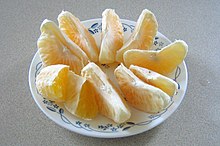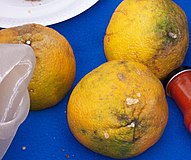Jamaican tangelo: Difference between revisions
→Description: Alpha list Tags: Mobile edit Mobile web edit |
No edit summary Tags: Mobile edit Mobile web edit |
||
| Line 14: | Line 14: | ||
|}} |
|}} |
||
The '''ugli''' {{IPAc-en|ˈ|ʌ|ɡ|l|i}} or '''ugli fruit''' is a Jamaican form of [[tangelo]], a [[Citrus|citrus fruit]] created by hybridizing a [[grapefruit]] (or [[pomelo]]), an [[Orange (fruit)|orange]] |
The '''ugli''' {{IPAc-en|ˈ|ʌ|ɡ|l|i}} or '''ugli fruit''' is a Jamaican form of [[tangelo]], a [[Citrus|citrus fruit]] created by hybridizing a [[grapefruit]] (or [[pomelo]]), an [[Orange (fruit)|orange]] and a [[tangerine]].<ref name="culinaire">[https://www.thefreelibrary.com/Grapefruit%3A+a+fruit+with+a+bit+of+a+complex.-a0177984107 Grapefruit: a fruit with a bit of a complex] in ''Art Culinaire'' (Winter, 2007)</ref> |
||
Its species is ''[[Mandarin orange|Citrus reticulata]]'' × ''[[Grapefruit|Citrus paradisi]]''.<ref name=Fruit>Bastyra, Judy, and Julia Canning. ''A Gourmet's Guide to Fruit.'' Los Angeles: HP Books, 1989. Pg. 52.</ref> |
Its species is ''[[Mandarin orange|Citrus reticulata]]'' × ''[[Grapefruit|Citrus paradisi]]''.<ref name=Fruit>Bastyra, Judy, and Julia Canning. ''A Gourmet's Guide to Fruit.'' Los Angeles: HP Books, 1989. Pg. 52.</ref> |
||
== Discovery == |
== Discovery == |
||
Ugli was discovered growing wild (possibly having developed in the same way grapefruit was created)<ref name="culinaire"/> in Jamaica, where it is mainly grown today.<ref name=Where>{{cite web | url=http://www.ugli.com/where_to_look.html | title=Where to look – UGLI | accessdate=February 13, 2012}}</ref> The name is a variation of the word "ugly", which refers to the fruit's unsightly appearance, with rough, wrinkled, greenish-yellow rind, wrapped loosely around the orange pulpy citrus inside.<ref name=Fruit /> '''UGLI''' is a [[registered trademark]] of Cabel Hall Citrus Limited, under which it markets the fruit.<ref>{{cite web | url=http://www.ugli.com/about_us.html | title=About Us – UGLI | accessdate=February 13, 2012}}</ref> |
Ugli was discovered growing wild (possibly having developed in the same way grapefruit was created)<ref name="culinaire"/> in Jamaica, where it is mainly grown today.<ref name=Where>{{cite web | url=http://www.ugli.com/where_to_look.html | title=Where to look – UGLI | accessdate=February 13, 2012}}</ref> The name is a variation of the word "ugly", which refers to the fruit's unsightly appearance, with rough, wrinkled, greenish-yellow rind, wrapped loosely around the orange pulpy citrus inside.<ref name=Fruit /> '''UGLI''' is a [[registered trademark]] of Cabel Hall Citrus Limited, under which it markets the fruit.<ref>{{cite web | url=http://www.ugli.com/about_us.html | title=About Us – UGLI | accessdate=February 13, 2012}}</ref> |
||
Revision as of 17:56, 5 October 2018
| Ugli fruit | |
|---|---|

| |
| Ugli fruit | |
| Scientific classification | |
| Kingdom: | |
| (unranked): | |
| (unranked): | |
| (unranked): | |
| Order: | |
| Family: | |
| Genus: | |
| Species: | C. reticulata × paradisi
|
| Binomial name | |
| Citrus reticulata × Citrus paradisi | |
The ugli /ˈʌɡli/ or ugli fruit is a Jamaican form of tangelo, a citrus fruit created by hybridizing a grapefruit (or pomelo), an orange and a tangerine.[1]
Its species is Citrus reticulata × Citrus paradisi.[2]
Discovery
Ugli was discovered growing wild (possibly having developed in the same way grapefruit was created)[1] in Jamaica, where it is mainly grown today.[3] The name is a variation of the word "ugly", which refers to the fruit's unsightly appearance, with rough, wrinkled, greenish-yellow rind, wrapped loosely around the orange pulpy citrus inside.[2] UGLI is a registered trademark of Cabel Hall Citrus Limited, under which it markets the fruit.[4]
Description
The light-green surface blemishes turn orange when the fruit is at its peak ripeness. An ugli fruit is usually slightly larger than a grapefruit (but this varies) and has fewer seeds. The flesh is very juicy and tends towards the sweet side of the tangerine rather than the bitter side of its grapefruit lineage, with a fragrant rind.
The taste is often described as more sour than an orange and less bitter than a grapefruit, however, and is more commonly guessed to be a lemon-tangerine hybrid. The fruit is seasonal from December to April. It is distributed in Europe and the United States between November and April,[3] and is on occasion available from July to September.
Gallery
-
Ugli fruit, peeled and sectioned
-
Roundish version
References
- ^ a b Grapefruit: a fruit with a bit of a complex in Art Culinaire (Winter, 2007)
- ^ a b Bastyra, Judy, and Julia Canning. A Gourmet's Guide to Fruit. Los Angeles: HP Books, 1989. Pg. 52.
- ^ a b "Where to look – UGLI". Retrieved February 13, 2012.
- ^ "About Us – UGLI". Retrieved February 13, 2012.


